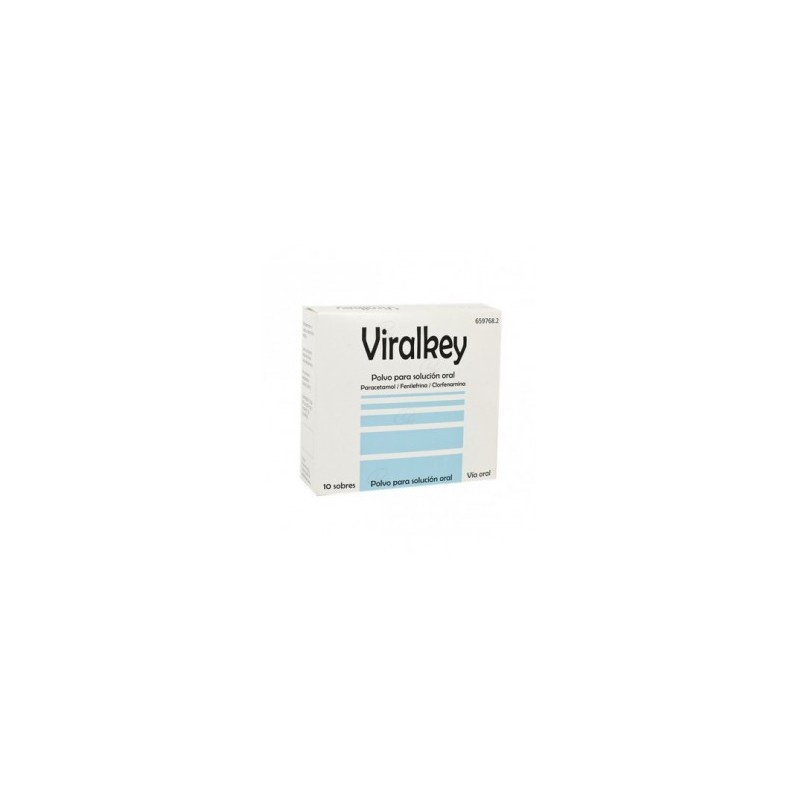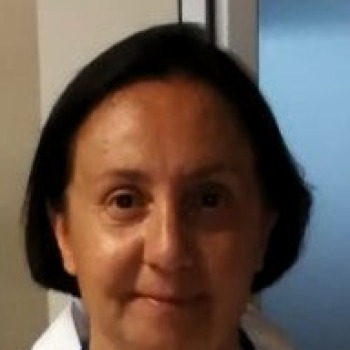
VIRALKEY powder for oral solution


How to use VIRALKEY powder for oral solution
Translated with AI
This page provides general information and does not replace a doctor’s consultation. Always consult a doctor before taking any medication. Seek urgent medical care if symptoms are severe.
Show originalContents of the leaflet
Introduction
Package Leaflet: Information for the User
Viralkey Powder for Oral Solution
Paracetamol/Phenylephrine/Chlorphenamine
Read all of this leaflet carefully before you start taking this medicine because it contains important information for you.
Follow exactly the administration instructions of the medicine contained in this leaflet or as indicated by your doctor or pharmacist.
- Keep this leaflet, you may need to read it again.
- If you have any further questions, ask your doctor or pharmacist.
- This medicine has been prescribed for you only. Do not pass it on to others. It may harm them, even if their symptoms are the same as yours.
- If you experience any side effects, talk to your doctor or pharmacist. This includes any possible side effects not listed in this leaflet. See section 4.
Contents of the Package Leaflet
- What is Viralkey and what is it used for
- What you need to know before you take Viralkey
- How to take Viralkey
- Possible side effects
- Storage of Viralkey
- Contents of the pack and further information
1. What is Viralkey and what is it used for
It is an association of paracetamol, chlorphenamine, and phenylephrine that acts by reducing nasal congestion.
Paracetamol is a pain reliever that reduces pain and fever.
Chlorphenamine is an antihistamine that relieves nasal secretion.
Phenylephrine is a sympathomimetic that reduces nasal congestion.
It is indicated in adults for the relief of symptoms of colds and flu that occur with fever or mild to moderate pain, congestion, and nasal secretion.
2. What you need to know before you take Viralkey
Do not take Viralkey
- If you are allergic (hypersensitive) to the active substances or to any of the other components of Viralkey (listed in section 6).
- If you have high blood pressure.
- If you have hyperthyroidism.
- If you have diabetes mellitus.
- If you have tachycardia (rapid heartbeats).
- If you are being treated with a monoamine oxidase inhibitor (MAOI) (such as some antidepressant medicines or medicines for treating Parkinson's disease).
- If you are being treated with sympathomimetic medicines (medicines used for treating asthma or medicines for accelerating heart rate).
- If you are being treated with beta-blocker medicines (medicines for the heart or for treating arterial diseases) (see: Taking Viralkey with other medicines).
- If you have glaucoma (increased eye pressure).
- If you have any serious heart or arterial disease (such as coronary artery disease or angina pectoris).
- If you have any serious liver or kidney disease.
Patients under 18 years of age must not take this medicine.
Warnings and precautions
Consult your doctor or pharmacist before starting to take this medicine.
- Do not take more than the recommended dose of medicine stated in section 3: How to take Viralkey.
- Chronic alcoholics should be cautious not to take more than 2 sachets of Viralkey per day.
- While taking this medicine, you must not take other medicines that contain paracetamol, as this could lead to a paracetamol overdose that could damage the liver.
- The following patients should consult their doctor before taking this medicine:
- Patient with kidney, liver, heart, or lung disease, and patients with anemia.
- Asthmatic patients sensitive to acetylsalicylic acid.
- Patient sensitive (allergic) to an antihistamine, as they may be sensitive to other antihistamines (such as chlorphenamine).
- Patient being treated with medicines for: prostate hypertrophy, bronchial asthma, very slow heartbeats, hypotension, cerebral arteriosclerosis, pancreatitis, peptic ulcer, pyloroduodenal obstruction, thyroid diseases, patient sensitive to the sedative effects of some medicines.
- If you are being treated with tricyclic antidepressants or medicines with similar effects and you experience gastrointestinal problems, you should stop taking this medicine and consult a doctor immediately, as you may develop paralytic ileus (stoppage of normal movements of a part of the intestine).
Children and adolescents
Patients under 18 years of age must not take this medicine.
Taking Viralkey with other medicines
Tell your doctor or pharmacist if you are taking or have recently taken or might take any other medicines.
In particular, if you are using any of the following medicines, it may be necessary to modify the dose of some of them or interrupt treatment:
- Medicines for treating epilepsy: Antiepileptics (lamotrigine, phenytoin, or other hydantoins, phenobarbital, methylphenobarbital, primidone, carbamazepine).
- Medicines for treating tuberculosis: (isoniazid, rifampicin).
- Medicines for treating convulsions and depression (barbiturates), used as hypnotics, sedatives, and anticonvulsants.
- Medicine to prevent blood clots: Oral anticoagulants (acenocoumarol, warfarin).
- Medicines used to increase urine elimination (loop diuretics such as furosemide, or other diuretics), and other diuretics that cause potassium loss (such as diuretics for treating hypertension or others).
- Medicines used to prevent nausea and vomiting: Metoclopramide and domperidone.
- Medicines used for treating gout (probenecid and sulfinpyrazone).
- Medicines used for treating high blood pressure and heart rhythm disorders (arrhythmias): Propranolol.
- Medicines for reducing cholesterol levels in the blood: (cholestyramine).
- Medicines used for treating depression, Parkinson's disease, or other diseases (Monoamine Oxidase Inhibitors (MAOIs)). You should wait at least 15 days after finishing treatment before taking Viralkey.
- Medicines used for treating migraine; medicines taken for childbirth; medicines taken for treating blood pressure or other diseases (alpha-adrenergic blocking medicines).
- Alpha and beta-adrenergic blockers such as labetalol and carvedilol (used for the heart or for treating arterial diseases).
- Medicines for treating depression (tricyclic and tetracyclic antidepressants).
- General anesthetic medicines.
- Antihypertensive medicines (medicines for lowering blood pressure).
- Medicines used for the heart such as cardiac glycosides and antiarrhythmics.
- Medicines containing thyroid hormones (used for treating thyroid diseases).
- Medicines used for heart or digestive diseases (atropine sulfate).
- Medicines that depress the central nervous system (such as those used for insomnia or anxiety).
- Ototoxic medicines (which have the adverse effect of damaging the ear).
- Photosensitizing medicines (which have the adverse effect of causing light allergy).
- Flucloxacillin (antibiotic), due to a serious risk of blood and fluid alteration (metabolic acidosis with high anionic imbalance) that must be treated urgently and that may occur particularly in cases of severe renal insufficiency, sepsis (when bacteria and their toxins circulate in the blood leading to organ damage), malnutrition, chronic alcoholism, and if the maximum daily doses of paracetamol are used.
Interference with laboratory tests
If you are going to have any laboratory tests (including blood or urine tests, etc.), inform your doctor that you are taking this medicine, as it may alter the results.
Taking Viralkey with food, drinks, and alcohol
While you are being treated with this medicine, you must not drink alcoholic beverages, as this may increase the risk of adverse effects of this medicine.
Additionally, the use of medicines containing paracetamol by patients who habitually consume alcohol (3 or more alcoholic drinks: beer, wine, liquor, ... per day) may cause liver damage.
Taking this medicine with food does not affect its efficacy.
Pregnancy, breastfeeding, and fertility
If you are pregnant or breastfeeding, think you may be pregnant, or are planning to have a baby, ask your doctor or pharmacist for advice before taking this medicine.
This medicine must not be taken during pregnancy unless your doctor considers it essential.
This medicine must not be used during breastfeeding, as it may cause adverse effects in the baby.
Driving and using machines
This medicine may cause drowsiness, affecting your mental and/or physical ability. If you experience these effects, avoid driving or using machines.
Viralkey contains sucrose
This medicine contains sucrose. If your doctor has told you that you have an intolerance to some sugars, consult them before taking this medicine.
Patients with diabetes mellitus should note that this medicine contains 3.994g of glucose per sachet.
3. How to take Viralkey
Follow exactly the administration instructions of the medicine contained in this leaflet or as indicated by your doctor or pharmacist. If you are in doubt, ask your doctor or pharmacist.
The recommended dose is:
Adults from 18 years: 1 sachet every 6-8 hours as needed (3 or 4 sachets per day). Do not take more than 4 sachets in 24 hours.
Patient with liver or kidney disease: You should consult your doctor. (See section 2 - What you need to know before you take Viralkey).
Use in children
This medicine is contraindicated in children under 18 years of age.
Use in elderly
Elderly patients should not use this medicine without consulting their doctor.
Because they may be especially affected by some adverse effects of the medicine, such as the appearance of slow heartbeats (bradycardia) or reduction of cardiac output, due to the content of phenylephrine and chlorphenamine. They are also more likely to experience adverse effects such as sedation, confusion, hypotension, or excitement, and may be more sensitive to effects such as dry mouth and urinary retention.
How to take it
Viralkey is taken orally.
Dissolve the contents of the sachet completely in a little liquid, preferably in half a glass of water, and then drink.
Always take the smallest effective dose.
Treatment with this medicine is subject to the appearance of symptoms. As they disappear, treatment should be discontinued.
If the fever persists for more than 3 days of treatment, pain, or other symptoms for more than 5 days, or worsen or new ones appear, you should consult your doctor.
If you take more Viralkey than you should
If you have taken an overdose, you should go to a medical center immediately, even if you do not notice symptoms, as they may not appear until 3 days after taking the overdose, even in cases of severe poisoning.
The symptoms of overdose may be: dizziness, vomiting, loss of appetite, yellowing of the skin and eyes (jaundice), and abdominal pain. Anxiety, fear, agitation, headache (may be a symptom of high blood pressure), convulsions, insomnia (or intense drowsiness), clumsiness, feeling of fainting, instability, confusion, irritability, tremors, anorexia; psychosis with hallucinations (especially in children). Dry mouth, nose, or throat. Effects such as high blood pressure, arrhythmias (rapid or irregular heartbeats), palpitations, decreased urine output, metabolic acidosis (decrease in blood alkaline reserve). With prolonged use, a decrease in blood volume may occur.
Treatment of an overdose is most effective if started within 4 hours of taking the overdose of the medicine.
Patient being treated with barbiturates or chronic alcoholics may be more susceptible to the toxicity of a paracetamol overdose.
In case of overdose or accidental ingestion, go immediately to a medical center or call the Toxicology Information Service (Telephone 91 562 04 20), indicating the medicine and the amount taken.
4. Possible side effects
Like all medicines, Viralkey can cause side effects, although not everybody gets them.
During the period of use of paracetamol, phenylephrine, and chlorphenamine, the following side effects have been reported, whose frequency has not been established with precision:
- The side effects that may appear most frequently are
Mild drowsiness, dizziness, muscle weakness: these side effects may disappear after 2-3 days of treatment. Difficulty in facial movements, clumsiness, tremors, alterations in sensations and tingling, dry mouth, loss of appetite, alterations in taste or smell, gastrointestinal disorders (which may decrease if the medicine is administered with food), nausea, vomiting, diarrhea, constipation, stomach pain, urinary retention, dry nose and throat, thickening of mucus, sweating, blurred vision or other vision disorders.
- The side effects that may appear with low frequency (rare) are
Discomfort, low blood pressure (hypotension), and increased levels of transaminases in the blood. Myocardial infarction, ventricular arrhythmia (irregular heartbeats), pulmonary edema (increase in lung fluid volume), and cerebral hemorrhage (at high doses or in sensitive patients).
Nervous excitement (generally with high doses and more frequent in elderly and children), which may include symptoms such as: restlessness, insomnia, nervousness, and even convulsions. Other side effects that may appear with low frequency are: chest tightness, lung noises, rapid or irregular heartbeats (generally with overdose), liver disorders (which may present with stomach pain or abdominal pain, dark urine, or other symptoms), allergic reaction, severe hypersensitivity reactions (cough, difficulty swallowing, rapid heartbeats, itching, swelling of eyelids or around the eyes, face, tongue, difficulty breathing, etc.), photosensitivity (sensitivity to sunlight), cross-sensitivity (allergy) to medicines related to chlorphenamine. Blood disorders (changes in the blood cell formula, such as agranulocytosis, leucopenia, aplastic anemia, thrombocytopenia) with symptoms such as unusual bleeding, sore throat, or fatigue; low or high blood pressure, edema (swelling), ear disorders, impotence, menstrual disorders.
- The side effects that may appear with very low frequency (very rare) are
Kidney disease, cloudy urine, allergic dermatitis (skin rash), jaundice (yellowing of the skin), blood disorders (neutropenia, hemolytic anemia), and hypoglycemia (low blood sugar).
Very rare cases of severe skin reactions have been reported.
Paracetamol may damage the liver when taken in high doses or for prolonged periods.
- The side effects whose frequency of appearance is not known are
Anxiety, irritability, weakness, high blood pressure (hypertension, generally with high doses and in sensitive patients), headache (with high doses and may be a symptom of hypertension), slow heartbeats (severe bradycardia), reduction of peripheral blood vessel caliber (peripheral vasoconstriction), reduction of heart output that especially affects elderly patients and patients with poor cerebral or coronary circulation, possible production or worsening of heart disease, urinary retention, paleness, hair standing on end, high blood sugar (hyperglycemia), low potassium levels in the blood, metabolic acidosis (alteration of metabolism), coldness in the extremities (legs or arms), flushing, feeling of fainting (hypotension). With high doses, the following may occur: vomiting, palpitations, psychotic states with hallucinations; with prolonged use, a decrease in blood volume may occur.
If you experience any side effects, talk to your doctor or pharmacist, even if it is not listed in this leaflet.
5. Storage of Viralkey
Keep out of the sight and reach of children.
Do not use Viralkey after the expiry date stated on the packaging, after EXP. The expiry date is the last day of the month indicated.
Do not store above 30°C.
Medicines should not be disposed of via wastewater or household waste. Return the packaging and any unused medicine to your usual pharmacy for disposal. If you are in doubt, ask your pharmacist how to dispose of the packaging and any unused medicine. This will help protect the environment.
6. Packaging Content and Additional Information
Composition of Viralkey:
-The active ingredients are: paracetamol, phenylephrine hydrochloride, and chlorphenamine maleate.
Each sachet contains:
Paracetamol…………….1 g.
Phenylephrine hydrochloride…..10 mg (equivalent to 8.21 mg of phenylephrine)
Chlorphenamine maleate……...4 mg (equivalent to 2.8 mg of chlorphenamine)
-The other components are: anhydrous colloidal silica, anhydrous citric acid, sodium saccharin, sucrose (3.994 mg/sachet), anhydrous sodium cyclamate, orange flavor.
Appearance of the Product and Packaging Content
Viralkey is a powder for oral solution, presented in boxes of 10 sachets.
Marketing Authorization Holder and Manufacturer
Marketing Authorization Holder:
PHARMINICIO S.L.
Aribau Street, 168
08036 Barcelona, Spain
Manufacturer:
Alcalá Farma Laboratories, S.L.
Madrid Avenue, 82
28802 Alcalá de Henares (Madrid)
Spain
This leaflet was approved in July 2023
Detailed and updated information on this medication is available on the website of the Spanish Agency for Medicines and Health Products (AEMPS) http://www.aemps.gob.es/
- Country of registration
- Prescription requiredYes
- Manufacturer
- This information is for reference only and does not constitute medical advice. Always consult a doctor before taking any medication. Oladoctor is not responsible for medical decisions based on this content.
- Alternatives to VIRALKEY powder for oral solutionDosage form: ORAL SOLUTION/SUSPENSION, 7 mg/mlActive substance: Hederae helicis foliumManufacturer: Engelhard Arzneimittel Gmbh & Co. KgPrescription not requiredDosage form: EFFERVESCENT TABLET, 600 mgActive substance: acetylcysteineManufacturer: Kern Pharma S.L.Prescription not requiredDosage form: EFFERVESCENT TABLET, 600 mgActive substance: acetylcysteineManufacturer: Laboratorios Alter S.A.Prescription required
Online doctors for VIRALKEY powder for oral solution
Discuss questions about VIRALKEY powder for oral solution, including use, safety considerations and prescription review, subject to medical assessment and local regulations.
Frequently Asked Questions















